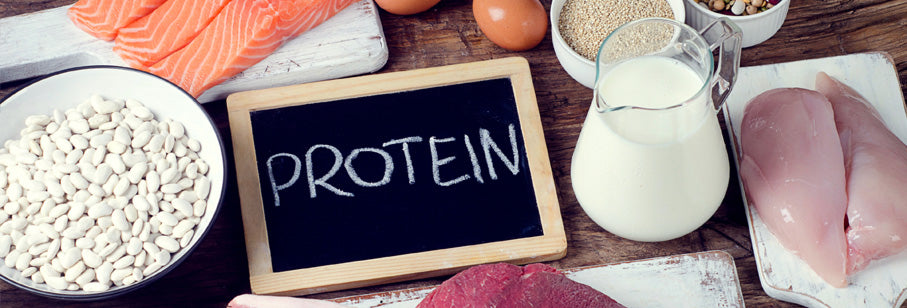Regardless of if you’re a weekend warrior who wants to stay in shape or an elite athlete competing on a stage or playing field, we all need protein. Protein comes in many forms from the whole food options you’d find in the grocery store to protein bars and shakes that help supplement your daily requirements. There are many benefits of adding protein to your diet and it’s important that you understand how to utilize protein to help you achieve your health and fitness goals and get the results you desire.
THE WHEN AND WHERE MATTERS
I cannot stress this point enough. Where you get your protein from and when you utilize it are extremely important. We all need protein in our diet. Even those who do not exercise at all need protein. However, those who regularly exercise and push themselves in the gym should be paying very close attention to this vital macronutrient.
When we put ourselves through bouts of intense exercise, we break down and create microtears in our muscle fibers. While we don’t perceive this process necessarily as “painful” the trauma created needs to be fully recovered prior to engaging in the same activity.
Following a workout, it’s important that we take in a quality protein source. Generally speaking, a liquid form would be your best bet if available. Liquid forms of protein are quickly and easily digested, allowing the nutrients to be shuttled out to the working muscles much faster than a whole food meal where the body would need to break down the food and eventually absorb it and transport the nutrients to the muscles.
All of this being said, you should still only use protein supplements outside of post-workout recovery as such – a supplement to a sound nutrition program. If you aren’t able to eat enough whole food sources of protein throughout the day (for whatever reason), that’s where a supplement would come into play.
Whole food sources of protein such as beef, chicken, fish, eggs, turkey, nuts, seeds, and legumes should be a staple in your meal planning. Try to have one (or more) of these sources present in each of your meals.
HOW MUCH PROTEIN SHOULD YOU CONSUME DAILY?
The NSCA recommends anyone over the age of 18 to take in a minimum of 0.66 grams of protein per kilogram of bodyweight each day. However, many lifters, athletes, and bodybuilders strive for around 1 gram of protein per pound of bodyweight.
While protein should be consumed following exercise, other meals can be fit into your everyday life as you see fit. If you want to follow an intermittent diet plan and it works for you, that’s great. If you prefer to spread your meals out over the course of the entire day, that’s fine as well. Meal frequency has been debunked, so feel free to work your nutrition around your schedule and life regardless if you choose to consume two meals a day or seven.
BENEFITS OF ADDING PROTEIN TO YOUR DIET
Protein can:
•Increase your lean muscle mass
•Help keep you satiated
•Enhance your metabolism
•Improve your mood
•Promote brain functioning
•Stabilize blood sugar levels
•Maintain strong bones
•Protect your heart health
•Boost immunity
•Lower your blood pressure
THE CONVENIENCE ASPECT
Protein is made up of amino acids and each amino acid serves a specific purpose in the body. Protein is also considered the building block for muscle growth. Having a constant supply of amino acids in the body helps the body repair torn down muscle fibers and speed up the recovery process.
Another of the benefits of adding protein to your diet is that when the body gets enough protein and amino acids through diet and supplements, torn down muscle fibers can rebuild and become stronger – this is what not only causes an increase in overall muscle size but also muscle strength. The more muscle mass on your frame, the more calories you will burn throughout the day – even while at rest!
So, having a quality protein source easily accessible is important. While I would always recommend that you plan out your meals and consider meal prepping, I also understand that life sometimes throws a curveball where you find yourself in a pinch looking for food. Having something like a protein shake or protein bar becomes ideal. There are many forms of these products on the market and it comes down to personal preference as to what you would prefer.
Convenient protein sources to consider:
1. Pre-packaged protein sources such as canned chicken or tuna can be a lifesaver in a pinch. Also nuts and seeds can come in handy if you need something on the go or you don’t have time to sit down for a full meal. If you don’t plan on eating the entire container or package, be sure you either have something you can transfer the source into or make sure you purchase a product that is resealable so it doesn’t go bad or spoil.
2. An RTD (ready-to-drink) shake is an extremely convenient option as all you would need to do is twist off the top of the container of something like a Labrada Lean Body RTD and drink the contents. No prep, no mess, no cleanup. It’s simply a high-quality protein source that comes pre-packaged.
3. Another option is a protein bar. These bars a generally small and can fit just about anywhere until you’re ready to eat it. They also make for a quick snack option if you need something in the middle of the day or between meals. A great tasting bar to consider are the Lean Body Protein Bars.
4. A final option I’d like to throw out there is a meal replacement powder. Again, I don’t recommend skipping a whole food meal for a supplement, but, sometimes they are necessary and come in handy due to time constraints, scheduling, or you simply forgot your lunch at home (rookie mistake). One of the best options I can recommend for this are pre-packaged meal replacement powders where all you need to do is fill up a shaker bottle with water, rip open the meal replacement package like the Labrada Lean Body MRP, dump it into the shaker bottle, shake it up, and drink.
The best part of all of the above is that they can be stored in your bag, briefcase, car, or desk drawer so you will always have access to a convenient protein source when needed. This tosses all excuses of “not having time to eat” out the window.
Hopefully, you found the information in this article surrounding the benefits of adding protein to your diet valuable and will consider utilizing and implementing some of the strategies found above. Cheers to good health and longevity!
Please Let Us Know If You Enjoyed This Article.
Your Feedback Is Important To Us
Disclaimer: This content is for informational purposes only and is not meant as medical advice, nor is it to diagnose or treat any medical condition. Please consult your physician before starting or changing your diet or exercise program. Any use of this information is at the sole discretion and responsibility of the user.













